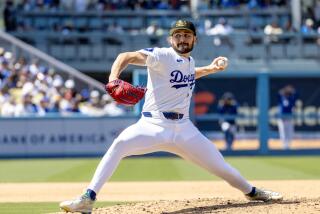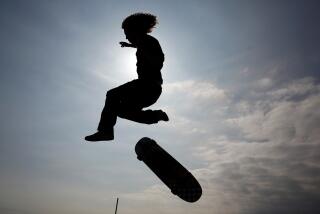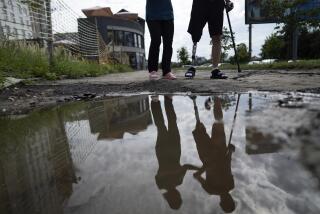He Battles Back After Accident : Goals: Luis Vivas had part of his right leg amputated in 1974. Now he wants to compete in the 1992 Paralympics in Barcelona.
- Share via
Luis Vivas hopped on his blue racing bike and pedaled quickly onto the bike path in Redondo Beach. A black ponytail hung beneath his blue and white helmet, a brown beard covered his face and an array of tattoos decorated his arms.
Vivas used to be a biker, the kind that, clad in blue jeans, a leather jacket and mirrored sunglasses, cruises on a motorcycle. But a dramatic accident that resulted in the loss of part of his right leg made him switch to the kind of bike that requires pedaling.
In 1974, a large truck ran a red light and hit Vivas, who was on a motorcycle. His right leg was crushed and later amputated below the knee.
“It was real dramatic, there’s no doubt about that,” said Vivas, who was a four-sport athlete at Lawndale High. “The first few years were frustrating. I was very angry. I was doing a lot of drinking and my family took lots of abuse.”
Vivas’ appearance hasn’t changed from his motorcycling days, but his lifestyle has. The 42-year-old from Redondo Beach seldom rides a motorcycle. He quit drinking and he is in great physical shape.
Later this month he will compete in the Canadian National Championships as part of the U.S. National amputee team. Vivas will run the 5,000 meters and compete in two time-trial cycling events.
He qualified for the Victory Games in New York last month, but withdrew after suffering food poisoning.
Last year, Vivas won a gold medal at the U.S. National Amputee Games in Ohio. He finished a 36-mile course at Bowling Green University in 1 hour and 10 minutes.
“I was very surprised. I was really overwhelmed,” Vivas said. “I just couldn’t believe it. Winning the gold really turned me on and gave me the incentive to go on with my training.”
A special foot, popular among athletic amputees, allows Vivas to run and cycle with ease. He says it absorbs shock and energy, unlike his previous foot, which was very stiff.
“I can run and jump and do lots of things I couldn’t do before,” Vivas said. “Before I had what they call a working foot, which was real stiff. This is giving me a chance to get back into my best physical ability.”
Vivas, a supervisor for a moving and storage company, started training seriously three years ago. He ran several 10-K races in 1990 and started cycling shortly after. He rides 250 to 300 miles a week on The Strand in Hermosa Beach and in the Palos Verdes hills. He also runs twice a week and trains with weights during lunchtime at work.
“He’s very dedicated and he has a real stick-to-itiveness,” said Dennis Kokas, one of Vivas’ riding partners.
Vivas met Kokas, a recreational cyclist, two years ago. Both men belong to the Hope Breakaways, a Christian riding club in Redondo Beach.
“In my book I’d say he rides as good as anyone without a handicap,” Kokas said. “He’s an excellent rider. I never worry about leaving him behind. He always keeps up with the group.”
Vivas says training is a way of consuming energy in a positive manner. He says being physically active has been therapeutic.
“I’ve had seven years of sobriety and this is part of my recovery,” he said. “I need to have athletics in my life. It gives me a chance to have goals in my life.”
Vivas recalls when he first got a prosthesis, shortly after his accident. He was playing in a softball league and a teammate yelled: “Get that cripple out (from) behind the plate!”
The 5-foot-8 Vivas says he applied physical force to the man, who never mentioned it again. He also said a comment such as that today would serve as motivation and not a source of anger.
“For years I had that attitude of ‘I can’t do a thing because I had a limb amputated,’ ” he said. “Now I see people with no arms and legs swimming across an Olympic pool. That’s winning something.”
Vivas’ goal is to compete in the 1992 Paralympics, which will be held in Barcelona, Spain, along with the Olympic Games. Kirk Bauer, executive director of National Handicapped Sports, says athletes are invited to participate in big events based on previous performances.
Bauer, a Vietnam veteran and former member of the U.S. disabled ski team, believes Vivas has a strong chance of going to Barcelona.
“He was invited to go to Canada as part of the National Amputee team based on his finishes in national championships,” Bauer said. “He’s a hard worker. He’s done very well in a short period of time.”
Vivas believes his performance in Canada will determine if he goes to Barcelona. That’s why he’s training extra hard for the event.
“There’s no doubt about it, I have to push harder than ever,” Vivas said. “I really have to look good in Canada.”
More to Read
Go beyond the scoreboard
Get the latest on L.A.'s teams in the daily Sports Report newsletter.
You may occasionally receive promotional content from the Los Angeles Times.






